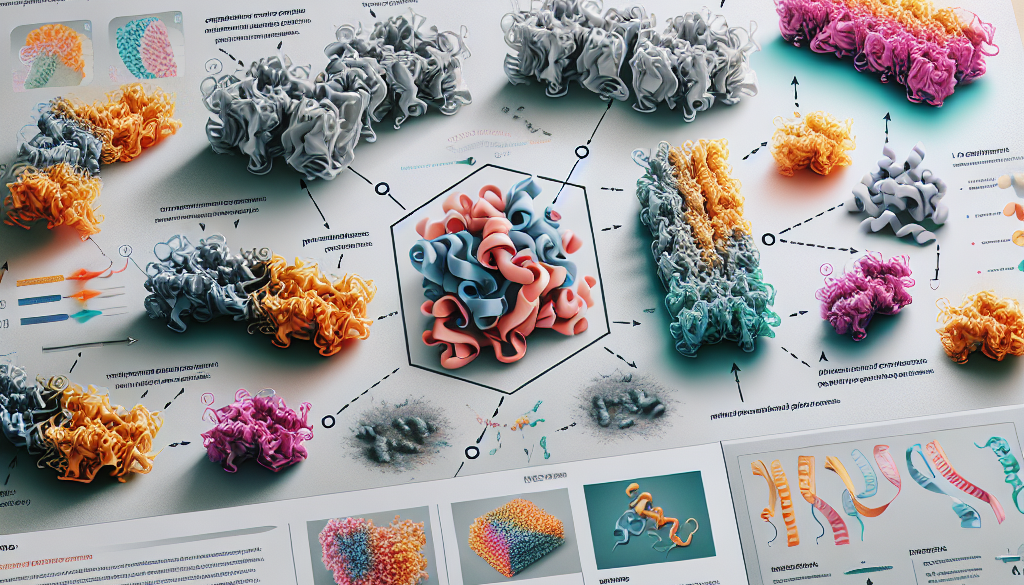Protein Folding Diseases: Understanding Misfolded Mysteries
-
Table of Contents
- Protein Folding Diseases: Deciphering the Misfolded Mysteries
- What Are Protein Folding Diseases?
- The Science Behind Protein Folding
- Examples of Protein Folding Diseases
- Understanding the Mechanisms of Misfolding
- Case Studies and Statistics
- Current Research and Therapeutic Approaches
- Prevention and Management Strategies
- Conclusion: Unfolding the Future of Protein Folding Diseases
- Discover ETprotein’s High-Quality Protein Products
Protein Folding Diseases: Deciphering the Misfolded Mysteries

Proteins are the workhorses of the cell, performing a vast array of functions critical for life. The three-dimensional structure of a protein is key to its function, and when folding goes awry, it can lead to a group of disorders known as protein folding diseases. These conditions arise from proteins that misfold, aggregate, and disrupt cellular function, leading to disease. Understanding these misfolded mysteries is crucial for developing treatments and improving the lives of those affected.
What Are Protein Folding Diseases?
Protein folding diseases, also known as conformational diseases or misfolding diseases, occur when the process of protein folding—whereby a protein assumes its functional three-dimensional shape—fails or is disrupted. This misfolding can result in nonfunctional proteins that aggregate and cause cellular damage. Examples of protein folding diseases include Alzheimer’s disease, Parkinson’s disease, cystic fibrosis, and Huntington’s disease.
The Science Behind Protein Folding
Proteins are made up of long chains of amino acids that must fold into precise structures to function correctly. This folding is guided by the protein’s amino acid sequence and is assisted by molecular chaperones in the cell. When folding is incorrect, it can lead to the formation of dysfunctional proteins that can aggregate and form insoluble fibrils or plaques, which are hallmarks of many neurodegenerative diseases.
Examples of Protein Folding Diseases
- Alzheimer’s Disease: Characterized by the accumulation of amyloid-beta plaques and tau tangles in the brain.
- Parkinson’s Disease: Marked by the presence of Lewy bodies, which contain misfolded alpha-synuclein protein.
- Cystic Fibrosis: Caused by misfolding of the CFTR protein, leading to thick mucus in the lungs and digestive system.
- Huntington’s Disease: Involves the aggregation of huntingtin protein with an expanded polyglutamine tract.
Understanding the Mechanisms of Misfolding
Research into protein folding diseases has revealed that misfolding can be due to genetic mutations, environmental factors, or a combination of both. These factors can disrupt the delicate balance of protein homeostasis, leading to disease. Understanding the precise mechanisms by which proteins misfold and aggregate is crucial for developing targeted therapies.
Case Studies and Statistics
Studies on diseases like Alzheimer’s and Parkinson’s have provided insights into the complex nature of protein misfolding. For instance, Alzheimer’s disease affects approximately 6.2 million Americans, with projections suggesting this number will rise as the population ages. Research into the tau protein in Alzheimer’s has shown that its abnormal phosphorylation can lead to misfolding and aggregation.
Current Research and Therapeutic Approaches
Current research is focused on understanding the pathways of protein folding and how to correct or prevent misfolding. Therapeutic approaches include the use of small molecules, antibodies, and gene therapy to target misfolded proteins and prevent their toxic effects. Clinical trials are ongoing for several potential treatments.
Prevention and Management Strategies
While there is no cure for many protein folding diseases, management strategies can improve quality of life. These include medications to manage symptoms, physical therapy, and lifestyle changes. Research into prevention is also a key area, with studies suggesting that a healthy diet, exercise, and cognitive engagement may reduce the risk of developing neurodegenerative diseases.
Conclusion: Unfolding the Future of Protein Folding Diseases
Protein folding diseases represent a complex and challenging area of medical research. Understanding the underlying mechanisms of protein misfolding and aggregation is essential for developing effective treatments. With continued research and clinical trials, there is hope for new therapies that can improve the lives of those affected by these devastating diseases.
Discover ETprotein’s High-Quality Protein Products
If you’re looking for premium protein products to support your health and dietary needs, consider ETprotein’s range of organic and plant-based proteins. Their products are designed with purity and quality in mind, providing you with the best options for your nutritional supplements.
About ETprotein:
ETprotein, a reputable protein Chinese factory manufacturer and supplier, is renowned for producing, stocking, exporting, and delivering the highest quality organic bulk vegan protein and plant proteins. They include Organic rice protein, clear rice protein, pea protein, clear pea protein, pumpkin seed protein, sunflower seed protein, mung bean protein, peanut protein etc. Their offerings, characterized by a neutral taste, non-GMO, allergen-free attributes, cater to a diverse range of industries. They serve nutraceutical, pharmaceutical, cosmeceutical, veterinary, as well as food and beverage finished product distributors, traders, and manufacturers across Europe, USA, Canada, Australia, Thailand, Japan, Korea, Brazil, and Chile, among others.
ETprotein specialization includes exporting and delivering tailor-made protein powder and finished nutritional supplements. Their extensive product range covers sectors like Food and Beverage, Sports Nutrition, Weight Management, Dietary Supplements, Health and Wellness Products, and Infant Formula, ensuring comprehensive solutions to meet all your protein needs.
As a trusted company by leading global food and beverage brands and Fortune 500 companies, ETprotein reinforces China’s reputation in the global arena. For more information or to sample their products, please contact them and email sales(at)ETprotein.com today.












